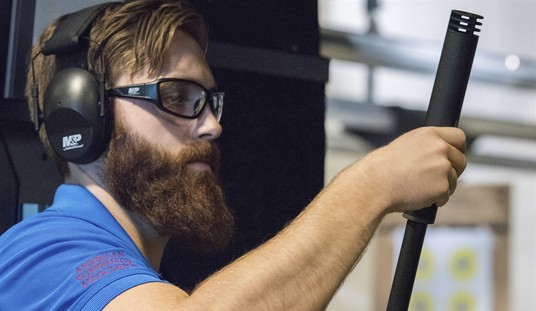The other month Cam and I got an invitation from Walk The Talk America to participate in one of their podcasts in panel form. Once all the stars aligned and schedules worked out, power got restored in Virginia after a snowstorm, we did all get to connect.
Walk The Talk America or WTTA as they’re known, is a group that’s dedicated to bridging the gap between the firearms world and mental health world. WTTA, like Doctors for Responsible Gun Owners (DRGO), is a group that I follow closely, rely on in my work, and really believe is doing work that’s meaningful. Mike Sodini, the president and founder of WTTA explains the inception of the organization during our chat.
I got into the firearms industry through nepotism, I got in working behind the scenes at one of the largest importers.[…] in 2009, the president of my company, near and dear friend to me, took his own life with a firearm. And being that I didn’t grow up around firearms, I kind of got in, like I said, through the family business, I was able to observe a lot of things about the industry. And one of the things I thought was very odd was that we couldn’t talk about suicide by firearm, right? Because we were afraid that it would be weaponized against us, which in many cases, it could be. But that’s something that affects our, our industry in our community. […] then we cut to 2018. And I get this opportunity to to bridge the gap between mental health and firearms and start this organization called Walk talk America. And here we are today.
What’d we talk about? Our personal relationships on the subjects of suicide, mental health, our work as writers and advocates, and more. Jake Wiskerchen a board member of WTTA who’s a licensed Marriage and Family Therapist, a National Certified Counselor, and Chief Clinical Officer and owner of Zephyr Wellness guided the chat asking our views on various topics.
Some of the highlights from our conversation that really stood out to me are worth sharing.
Cam brings up a point that’s really important and worth repeating. It’s on the subject of not just suicide by firearm, but suicide overall. Yes, the finality of a suicide attempt via firearm is much greater than say other means, however our entire culture inclusive of all demographics and nations, as well as all means for death by suicide is worth addressing as a whole.
And you know, look, I’ll be honest, I don’t like the idea of talking about preventing suicide by gun. I like talking about preventing suicide. Obviously, as gun owners, we have to be aware that, you know, suicide by firearm is one of the most lethal forms of suicide right? It’s, it’s much more effective. It’s permanent. It lasts. But I too get bothered by this insistence that well, the…the only way to address this issue is through more gun control laws, because you’re right, that puts our back up [against a wall].
The founder of and former editor of Bearing Arms, Bob Owens died by suicide by firearm. Cam talked a little about the devastation that was left behind, as well as people’s unwillingness or apprehension to confront the topic head on.
[…] Bob Owens, took his own life. And you know, Bob and I were close, but I’ll tell you, I am, I was much closer friends with some of Bob’s close friends. And I saw firsthand the devastating effect that Bob’s death had on his friends and his loved ones. And this is something that, you know, again, there is that sort of impetus of well, let’s not talk about it, because there was a gun involved. But it to me, it’s when we get into that apprehension, you know, we’re not able to move forward, and we’re not able to talk about these things. And we absolutely need to, because I think the best way of addressing this is what we are seeing here, this sort of volunteerism, this idea of listen, as long as we can talk about this, as long as there are options for people to, you know, temporarily have somebody store their firearms if need be.
I think that’s a so much more effective way of saving lives, which is what this is about, than, you know, demanding that we have some sort of storage law, or we have a red flag on the books, if we’re looking out for each other. And if we as an industry are giving people those, those tools that they need to protect themselves, protect their families, when someone that they know or love is in a crisis that matters.
The concept of volunteerism that was brought up, I think is one of the more salient ways for policy makers to approach gun owners on this topic. We’re constantly dealing with a barrage of legislation limiting our rights. This all comes with the modifier from the political hacks and gun grabbers that “This is for your own good” or “This is in the interest of public safety.” Hardly ever are we offered options that are not prohibitionist. Educating people and creating incentives are two ways we can really get ourselves closer to the goal of mitigating suicide by firearm as well as stopping negligent firearm incidents from occurring. My thoughts on the topic:
[…] we have these negligent situations that occur. And they’re all bad. They’re all tragic. Nobody likes them. Nobody wants to see them happen. Okay, so what about quality compliance. Instead of saying we’re going to create a law, that it requires you to lock up the firearm and keep it separate from the ammunition, we incentivize this? And how can you incentivize this? You can incentivize it by saying, “hey, maybe we’ll give you a tax credit, or we’ll give you a rebate on, you know, firearm storage devices.” This is something that I’m, you know, a big proponent of. This is, you know, pushing to incentivize this[…] [I]nvite and make it inviting for somebody to want to do the right thing. So to say, I mean, sometimes you need a little bit of a carrot. I mean, everything in New Jersey is a perfect example. It’s like 100% stick. That’s all you get in Jersey is the stick! You don’t get any carrot. Zero carrot. Zero carrots given in the state of New Jersey.
Wiskerchen summed up this concept quite well.
Ultimately, people are going to do what’s in their best interest. If they’re properly equipped with the right information. Take it back to firearms safety, responsible storage, negligence. Educate people, like keep…keep guns out of the hands of kids. Like that’s common sense.
We do have a responsibility to get involved and stay involved. Cam pulls the big picture into perspective on our need to be engaged:
I think one of the things that happens, as you say, because gun control activists are the ones who’ve been driving this conversation. And as soon as you mentioned firearms and suicide to a gun owner, we shut down, right? And it’s not necessarily that we don’t want to talk about it. But we just sort of instinctually know, okay, here comes the lecture, here comes somebody wagging their finger at me telling me why I’m a bad person, because I don’t support their policy solutions. And one of the things that I think is really important is to show that it’s not that gun owners don’t care about this issue. It’s not that gun owners are apathetic about this issue. It’s just that we have different ways of addressing this topic that we think are going to be more successful, that we think are going to be more productive, that we think are going to save more lives, than trying to ram another law down our throats. […] this is an issue that’s too important for for us to leave to the people who don’t respect our rights. And it’s too important for us to leave for the people who we love, and we care about who may find themselves in a crisis one day.
I engrain that precept into my own work, written or otherwise. If we don’t act, no one will. I was asked about the motivation of why I do what I do in the Second Amendment community:
So, like the Lorax, you know, he spoke for the trees, right? So, when you have all of these groups come together to speak for “gun violence”, or for stopping people from dying by suicide via firearm, or whatever the subject is, when you go on the legislative end of things. Where’s our Lorax? Right, our voice is very often not heard.
One of the questions Mike Sodini asks nearly all the participants of the podcast is “What do you do to tend to your mental health?” I was asked that last year when I was a guest then, and I talked about writing as well as quality time with my family to help keep me grounded. Sodini directed his query to Cam. How does the great bearded one tend to his mental health? You’ll have to tune in to the full episode for that answer!
Our interview lasted about an hour and ten minutes and the time went by quickly. Do check out the interview in full in the embed up above, or by clicking HERE. You can also catch the WTTA podcast at their main podcast page HERE or through your favorite podcast providers. Make sure to like, subscribe, and share:
Guns and Mental Health by Walk the Talk America Google Podcasts
Guns and Mental Health by Walk the Talk America on Apple Podcasts
Guns and Mental Health by Walk the Talk America (buzzsprout.com)








Join the conversation as a VIP Member